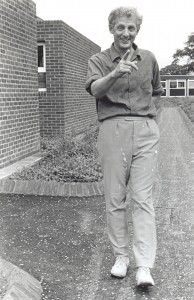An Open and Shut Case
Friday, February 11th, 2011The UCU (University and College Union) recently commissioned a report, Universities at risk. The impact of cuts in higher education spending on local economies, which concluded that across England, 49 universities were at risk of closure and that, of all the pre-92 universities, the OU is most at risk. It features in the list of 22 HEIs at ‘high medium’ level of potential impact from the proposals made in the Browne Review (2010), Securing a sustainable future for higher education. This means that the OU has at least eight of the maximum of 12 ‘risk’ points. A recent survey of university leaders revealed that nine out of ten expect an institution to close due to financial pressures. The OU has faced the possibility of closure before. In the past it rallied students and staff to defend it. (more…)
 In 1980 the BBC cancelled a lecture on nuclear arms by the Dean of Science Michael Pentz. The BBC told the University that is was ‘inappropriate and unsuitable’. The lecture had already been filmed and the cancellation prompted an outcry including an emergency motion in the Senate. The BBC was at the same time facing criticisism for its decision not to screen The War Game, a film about nuclear war made for the twentieth anniversary of the Hiroshima bombing in 1965 but not shown until 1985.
In 1980 the BBC cancelled a lecture on nuclear arms by the Dean of Science Michael Pentz. The BBC told the University that is was ‘inappropriate and unsuitable’. The lecture had already been filmed and the cancellation prompted an outcry including an emergency motion in the Senate. The BBC was at the same time facing criticisism for its decision not to screen The War Game, a film about nuclear war made for the twentieth anniversary of the Hiroshima bombing in 1965 but not shown until 1985.